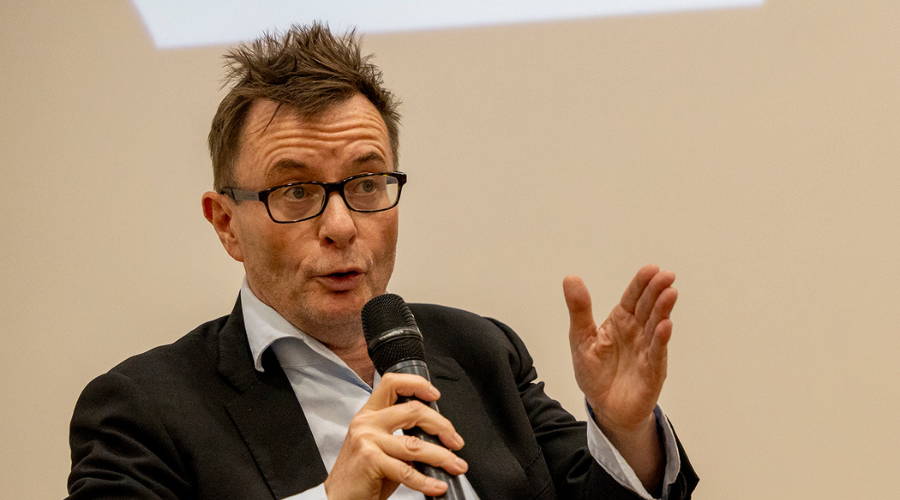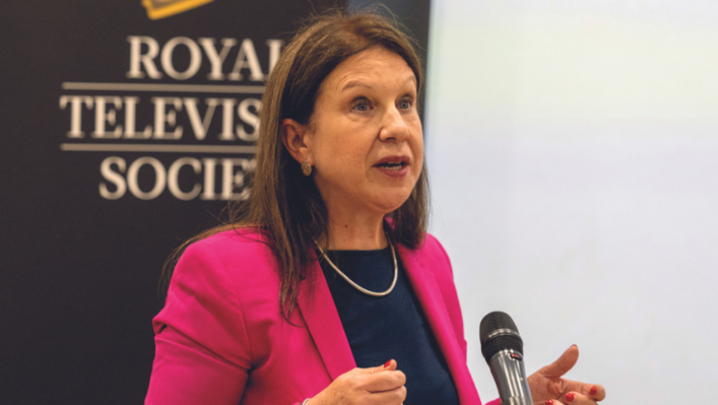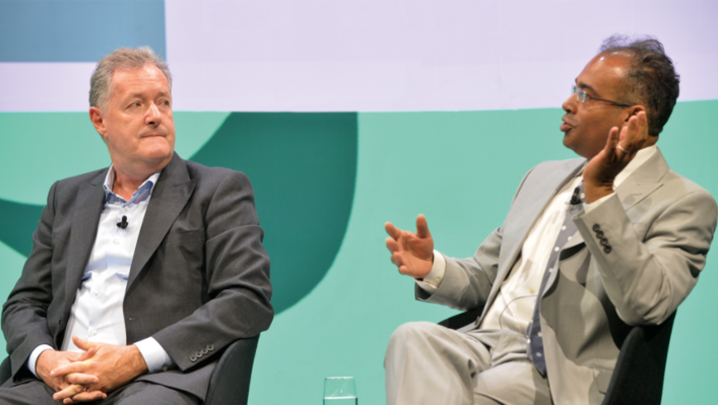John Ryley makes his case for more rigorous royal reporting
The recently departed Head of Sky News was in combative mode as he outlined three recommendations to improve British broadcast journalism.
First, John Ryley said: “Broadcasters should start reporting on the Royal Family with the same rigour as they treat every [other] story on the news agenda.… They are too supine, too incurious, too compliant.
“The Royal Family and their spin doctors – whatever fancy titles they have – need to understand the age of editorial deference is well and truly over.” Citing the coronation of Charles as an example of the control Buckingham Palace seeks, he said: “[It] set out to totally dictate what could be broadcast… impos[ing] a series of extraordinary restrictions on the use of the video, the pictures of this rare national event.
“Topics such as why King Charles didn’t pay any inheritance tax on the fortune he inherited from his mother... should be examined properly.
“The British monarchy receives taxpayer money through the Sovereign Grant, the monarchy’s annual budget. A Treasury review this summer revealed [that] the Royal Family’s grant is due to increase from £86m to £125m. The Sovereign Grant needs more scrutiny.
“Lord Turnbull, a former Cabinet Secretary, Whitehall’s most senior civil servant, accused the Treasury of seeking to obfuscate how the monarchy was funded. He told The Guardian: ‘You get people writing in saying that it was a good thing that the King was so sensitive to public opinion that he had waived some of the money he could have had.’
“Lord Turnbull went on: ‘I think it’s bollocks. It is deliberate – that’s really what makes me so cross about it. It is a deliberate attempt to obfuscate how the thing works.
“Surely in a democracy, there must be accountability to the public, to understand the return on their investment?”
Later, during a Q&A, Sally Osman, who described herself as “one of those former spin doctors at the Royal Household”– in reality, she was Director of Royal Communications for HM Elizabeth II – took Ryley to task.
She said: “I don’t recognise the characterisation that you’ve drawn of what it’s like within the Palace. I certainly remember being on the receiving end of a lot of very, very tough questions.”
Osman pointed out that there is a formula for calculating the Sovereign Grant, which is “essentially based on the profits of the Crown Estate, which is doing exceptionally well. More money has gone into the pot recently because they’re refurbishing Buckingham Palace, which is essentially falling down.”
Addressing Ryley’s contention that there was a lack of accountability about the Royal finances, she added: “The Sovereign Grant has an annual report, which is published and laid before Parliament. There is a regular annual press conference [held] by the arcanely named Keeper of the Privy Purse, who is, in essence, the [Royal] finance director, who takes questions from the media.
“When I was there we invited a lot of the financial media who know how to read a spreadsheet but they rarely came because, as you will know, a lot of the royal correspondents don’t like others invading their turf. And so the question I would throw back to you is: ‘For this level of interrogation, should the journalists be of the quality [to ask] the right questions of the institution?’”
Ryley said this was a “good point”.
In his lecture, Ryley had concluded his Royal recommendations with the proposal that: “The start of the Carolean era is a ripe moment to reassess our approach towards royal reporting… the Royal Household, too, needs to change its ways, allowing more access, answering difficult questions and taking accountability.
“Greater openness is not about stripping the monarchy of its dignity or disturbing royals’ personal privacy. It’s all about promoting a culture of openness that gives the public a truthful view of their monarchy.”
Ryley’s second recommendation was that broadcasters “should report less British politics to make it more relevant to the voters. Far too much airtime is focused on Westminster gossip… and not enough on the decisions the Government and parliament are taking. Broadcast journalists need to recommit to political reporting, offering facts and analysis that people can use to make decisions.”
Looking to the general election, he said: “Voters need to see the Prime Minister and Leader of the Opposition debate the big issues facing the country at election time. My message to the broadcasters: don’t overthink the election debates; keep it simple – just Rishi Sunak and Keir Starmer, head to head.”
His final recommendation focused on free speech: “Today, a new ruling elite is trying to stifle freedom of expression in these islands.… A big group of advertising agencies have been mounting a boycott of ‘right-wing’ news outlets here in Britain.
“The self-styled ‘Conscious Advertising Network’ has boycotted the start-up GB News.… This action represents a threat to free speech, putting the business model of this start-up in jeopardy.
“Freedom of expression is vital to our democracy… And let’s be clear; the new news channels have been launched to satisfy an increasing thirst in the UK for a diversity of opinions. It’s an awkward fact for some – GB News’s audience is growing.
“The British public has the right to hear the full range of political perspectives. The advertising boycott of GB News should end. It is an insult to the British people.”
Reporters ‘stuck in a time warp’
Fellow lecturer Lyse Doucet pressed John Ryley on his call for more rigorous royal reporting. He reiterated his belief that: ‘We’re stuck in a time warp and we need to move on – and now’s the time to start with the new reign.’
Ryley recalled a run-in with the Royal Household last January, when Sky News reporter James Matthews asked (the then) Prince Charles about Prince Andrew being stripped of his military titles. ‘Within a couple of hours I had an email: “How dare your correspondent do that!” I then got phoned and was summoned to a meeting, which I didn’t go to.
‘They want the story told their way; they don’t really want to engage with journalistic rigour.’
Responding to a member of the audience who asked whether it was ‘fine if GB News goes to where Fox is now?’, Ryley replied: ‘My central point was that the [advertising] boycott is going to damage a start-up, and I’m sure GB News will evolve over time, just as Sky News and the BBC have evolved.’
John Ryley delivered this speech as part of the Steve Hewlett Memorial Lecture 2023, alongside Steve Rosenberg and Lyst Doucet.







